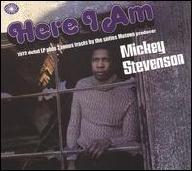In 1961, Stevenson teamed with co-writer Barrett Strong to score his first major hit, Eddie Holland's Jamie. For the Marvelettes' Beechwood 4-5789, he partnered with Motown founder Berry Gordy, Jr., as well as recent roster addition Marvin Gaye. Weeks later, Motown released Gaye's first hit single, Stubborn Kind of Fellow, which Stevenson co-wrote as well. Backing vocals on the record were contributed by Martha Reeves, then Stevenson's secretary, and her group the Vandellas; when singer Mary Wells failed to show up for a subsequent session, Stevenson cut a record with Martha the Vandellas instead, resulting in the group's 1963 debut I'll Have to Let Him Go. That same year, the producer inspired the Miracles' smash Mickey's Monkey. In 1964, Stevenson, Gaye, and Ivy Hunter collaborated on Martha the Vandellas' Dancing in the Street, his biggest songwriting hit for the label. Equally important, and around that same time, he hired Norman Whitfield as his A&R assistant, launching the career of one of Motown's most influential and successful staff producers.
Stevenson's last major hit for Motown was 1966's classic It Takes Two, a duet between Gaye and the producer's wife, Kim Weston. In early 1967, both Stevenson and Weston left Motown to form their own label, People. That spring, Weston signed to MGM and her husband was offered a reported million-dollar deal to assume control of the company's floundering Venture subsidiary. The Midas touch Stevenson possessed in the past soon dissipated, however, so in 1969 he shifted gears and scored the film #Changes. He went on to write and produce a series of theatrical musicals, including #Swann, #Showgirls, #Wings and Things, #The Gospel Truth, #TKO, and #Chocolate City. For 1999's #Sang, Sista, Sang -- a tribute to legendary vocalists like Bessie Smith, Billie Holiday, and Josephine Baker -- he reunited with fellow Motown alum Smokey Robinson. ~ Jason Ankeny, Rovi


















